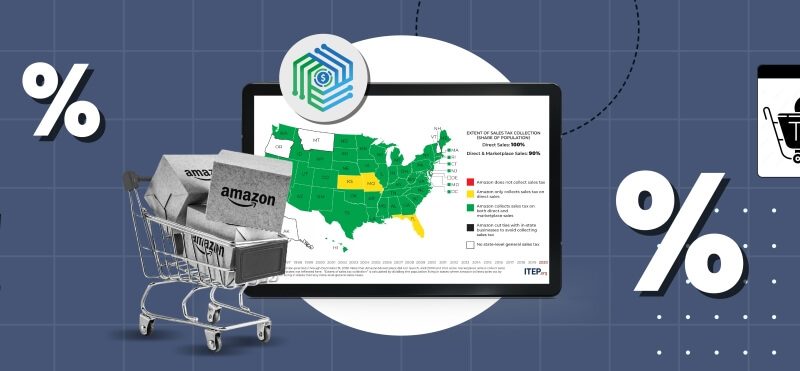Come tax season, tax accountants get buried in paperwork and do their best to save the day for businesses of different sizes. But can you ease the strain and optimize tax filing for e-commerce companies with lots of sales? This is the question Travis K, an e-commerce accountant serving a couple of online businesses, has managed to answer.
Recording Amazon sales tax correctly
Travis, who has been working with Amazon businesses for several years, knows first hand the challenges of Amazon sales tax collection and working with the Marketplace Facilitator Tax. This tax is collected and remitted on behalf of merchants by Marketplace Facilitators or Providers such as Amazon if orders are shipped to customers located in states or countries with similar taxes enacted. The purpose of this tax is to simplify the tax payment process for Amazon sellers as the trading platform helps with tax collection, that is withholds and remits taxes on their behalf.
However, while the Marketplace Facilitator Tax may simplify tax payments for his Amazon client, Travis knows that the withheld taxes must still be accounted for in their books, just like sales. These taxes are considered expenses for the merchant and are inevitably associated with their business. Therefore, they must be tracked on the expense account to ensure accurate financial reporting.
As an accountant with a client who sells on Amazon, I came across an issue with recording the taxes paid by Amazon for the business. I was seeking an easy way to automate the process, but dealing with taxes proved to be quite challenging. The issue arises because taxes should ideally be recorded and paid out simultaneously, with the tax account functioning as a clearing account. Sales tax collection was a nightmare. Unfortunately, many tools were unable to process this correctly, with some even ignoring taxes entirely. As a result, I had to manually adjust the imported data in QuickBooks to ensure accurate recording of taxes.
With the increasing number of sales and transactions, manually adjusting imported data in QuickBooks for his Amazon sellers became time-consuming and prone to errors. That’s when, attending one of the conferences, Travis found out about Synder.
Amazon sales tax collection with Synder: Record your sales taxes on Amazon automatically
Understanding the challenges of accurately recording taxes for businesses selling through online marketplaces like Amazon, Travis was thrilled to discover Synder, a powerful tool that automates the tax recording process and ensures compliance with tax laws. But what he liked even more was the Daily Summary feature, which provides an overview of all transactions made during the day including Amazon sales, with detailed information on taxes collected and withheld.
One of the biggest advantages of Synder is its ability to handle taxes seamlessly. Unlike other tools that ignore taxes or process them incorrectly, Synder’s Daily Summary feature enables you to map taxes payable and taxes withheld (paid) to the same tax payable account and will be reflected on the balance sheet. Now Amazon’s taxes clear out automatically on their own!
What it basically means is that sales taxes are recorded and paid out at the same time, and the tax account becomes a clearing one. The result is a hassle-free tax recording process that saves time and reduces errors. The Daily Summary feature allows Travis to post tax amounts directly to balance sheet accounts. But, as he found out during his onboarding with a specialist, Synder can generate tax reports and post tax amounts to the balance sheets for businesses that use per transaction sync. That means that he found the tool that can solve the tax problem for his smaller clients and doesn’t center on a single mode of synchronizing data.
Achieving more than just sales tax collection – a comprehensive picture of your sales
Having successfully automated tax withheld management for his Amazon clients, Travis is optimistic about his future with Synder.
After experiencing the benefits of Synder myself, I’m confident in recommending it to other e-commerce clients. In fact, I’m now transferring another client with PayPal and Walmart to Synder because they have taxes withheld by these providers.
Travis’s approach involves using a combination of technology and expertise to streamline the tax process. By leveraging specialized software, he can automate many of the repetitive tasks involved in tax preparation, saving time and reducing the risk of errors. This frees him up to focus on more complex aspects of tax management, such as interpreting regulations and providing strategic tax planning advice.
With Synder, my clients can feel safe that their taxes are being recorded accurately and efficiently, and they can focus on growing their business instead of worrying about bookkeeping and taxes.
With Synder’s Daily Summary, e-commerce businesses can stop worrying about accounting for taxes regardless of the taxes withheld in the equation. Sales tax collection becomes easy – the software automates tax management, saving accountants and business owners valuable time and minimizing the risk of costly errors. The tool is designed to seamlessly integrate with popular e-commerce platforms like Shopify, WooCommerce, Amazon, and eBay, making it a versatile solution for businesses of all sizes.
The 15-day free trial is the perfect opportunity for e-commerce businesses to create a free trial account and check out Synder’s tax management features and see how it can simplify their business operations. Additionally, booking office hours with a specialist allows for a more personalized demonstration of the tool’s capabilities and a chance to get any questions answered and details clarified. Don’t let tax management burden your business – try Synder today and experience the benefits of automated tax management.







Thanks for the article! Was helpful to learn about amazon sales tax.
Thank you David!